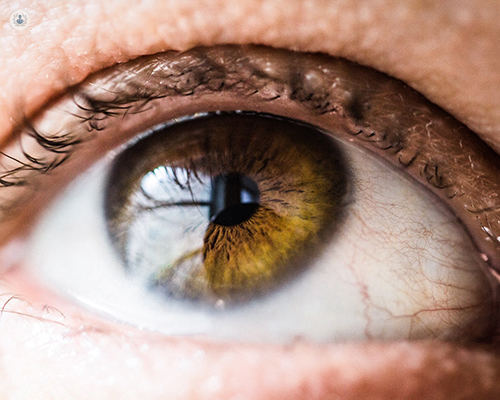How does retinal detachment affect your vision in the long term?
Escrito por:Retinal detachment is a serious eye condition that can have lasting implications on your vision if not treated promptly. The retina, a thin layer of tissue at the back of the eye, is responsible for detecting light and sending visual signals to your brain. When this delicate tissue separates from its supporting layer, it can lead to significant visual disturbances and, in some cases, permanent loss of sight.
Here, an esteemed opthalmologist explores how retinal detachment can impact your vision in the long term.

What are the common symptoms of retinal detachment?
Before discussing long-term effects, it’s important to understand the symptoms that may indicate a retinal detachment. People often report a sudden increase in floaters (small shapes or shadows moving across your field of vision) or flashes of light, followed by a dark shadow or "curtain" appearing in their peripheral vision. These symptoms should not be ignored, as early treatment is critical in minimising damage.
How does retinal detachment affect vision permanently?
The extent of long-term vision loss depends on several factors, including how quickly the detachment is treated and which part of the retina is affected. When the central part of the retina, known as the macula, is involved, vision may be more significantly impaired. The macula is crucial for sharp central vision, allowing you to read, drive, or recognise faces.
If detachment damages the macula, even after successful surgery, some patients may experience residual blurriness, distortion, or reduced ability to see fine details. Peripheral vision may also be affected if the detachment occurs in those areas, although this is less likely to impact daily activities.
Can surgery fully restore vision?
Surgical repair is the primary treatment for retinal detachment and involves reattaching the retina to its proper position. Techniques include pneumatic retinopexy (injection of a gas bubble to push the retina back), scleral buckling (using a band to compress the eye), and vitrectomy (removal of the gel inside the eye). While surgery is often successful in preventing further vision loss, it may not fully restore sight to its previous clarity. Scar tissue or permanent damage to retinal cells may limit recovery.
Is vision loss always noticeable after treatment?
In some cases, patients regain most of their vision after treatment, especially if the detachment was caught early. However, lingering issues such as decreased contrast sensitivity (difficulty distinguishing between shades of light and dark) or a reduced field of vision can persist. Night vision may also be affected, making activities like driving in low light more challenging.
Can preventive measures reduce long-term impact?
Timely diagnosis and treatment remain the most effective ways to minimise long-term effects. Regular eye exams are vital, particularly for individuals at higher risk, such as those with severe myopia (short-sightedness), a history of trauma, or prior eye surgeries. Addressing symptoms early offers the best chance of preserving vision.


